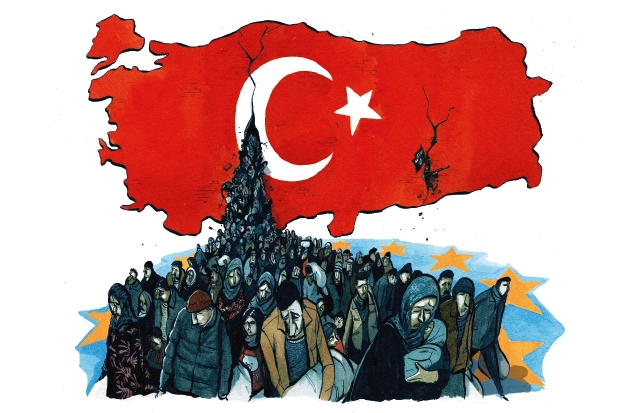President Erdogan is no stranger to blackmailing the EU. He has previously used migrants as a ‘loaded gun’ with which to threaten European leaders. The message is clear: do what I say, or I’ll open the floodgates. This week, he’s been back to his old tricks – bashing the EU and making it clear that if membership talks failed, Turkey would open its borders and allow its three million refugees to stream into Europe. But what sparked this latest resurgence of fighting talk from Erdogan?
The clue lies in the vote last week in Strasbourg, when 479 MEPs backed a decision to halt the process of Turkey’s EU accession. This seemed like a long-due reaction, given recent events in Turkey, where Erdogan has responded to the botched July coup by locking up some 30,000 people, sacking 10,000 civil servants and tightening his grip on the media. But while there is little doubt that the balance of power in Turkey lies with Erdogan, the Turkish president is always keen to remind potential dissenters that his sphere of influence extends far beyond Turkey’s borders. Erdogan doesn’t care much about what MEPs think of him. But he is keen to show the Turkish electorate – and domestic opposition – how far his power extends. And his biggest weapon – the migrant crisis – remains as potent as before. As I wrote in March, it seemed to be ‘only a matter of time before the blackmail intensifies’ – and we are now seeing those threats come to fruition.
This has been entirely foreseeable. Since the beginning of the migrant crisis talks, neither side has been open with each other. For France and Germany, the deal was essentially an electorally cheap way of shrugging off responsibility for their home-grown migrant crisis. They had been dangling EU membership in front of Turkey for the last 53 years. As Ilnur Cevik, senior advisor to the President, commented in his Daily Sabah column – ‘They have no intention of letting Turkey in as a member but they are such cowards to admit this.’ Accelerating the talks last November was an empty gesture; just as empty as halting them has been.
Yet Erdogan’s commitment to the agreement has been equally faint. The day after the November aid deal was struck last year, Turkey rounded up over 1,300 migrants on the beaches in a spectacular sting operation. Since then, little else has happened. The beaches around Izmir remain largely unpoliced and the people-smuggling industry is booming. On a trip to the Turkey-Bulgaria border, I was able to find the daily estimate of the prices for illegal passage. So both sides bluffed. But the key difference is that Erdogan called the EU’s bluff early.
So with seemingly little to lose, Turkey has been milking the EU for all its worth and syphoning all the aid – with over 6.5 billion euros contracted to Turkey in the largest humanitarian programme the EU has ever financed. Meanwhile, Europe stands by watching years of its soft-power influence undone in Turkey: Erdogan is locking up journalists and is also cracking down on the Kurds. Only last week, Ahmet Turk, a prominent Kurdish Peace and Democracy Party (HDP) MP, was arrested. But despite this, the EU has failed to work out what to do – and so Turkey keeps on receiving EU benefits.
What’s more, key European leaders are in no place to take on Erdogan right now: the French Presidential elections in April, and the German elections in August mean that the European leaders that matter most simply cannot afford for the refugee crisis to resurface. Amidst a climate of fear that so-called populists may punish the establishment parties at the ballot box, such a scenario would acknowledge that the likes of Front National, Alternativ für Deutschland and Victor Orban were right all along – and could easily catapult them into power. The alternative – strengthening the EU’s outer borders – isn’t an option either: it would mean admitting that the core policy of openness has failed.
What happens next will unravel quickly: in a few days, on 4 December, two momentous votes will take place. Italy’s Prime Minister Renzi will fight in a referendum, which he is likely to lose, pushing the EU’s third largest economy to the brink of financial collapse. At the same time, the second round of the Austrian election, largely fought over anti-immigrant sentiment, will come to a head. A collapse of the EU-Turkey deal could have a major influence in both instances.
This is the perfect time for Turkey to up the ante – to ‘push for real concessions’, as President Erdogan’s advisor has put it. The more the EU publicly reneges on its promises, the more Erdogan will be hawkish. His approval ratings in Turkey are soaring to their highest levels since he became President in 2014; it’s clear that this popularity owes much to his uncompromising role in foreign policy.
In the mean time, the unstable compromise that has endured for now is starting to crack. Last week’s vote in the European Parliament shows that the EU has no way to back out elegantly – and Erdogan knows it. The key question of when Turkey will open the floodgates resurfaces. If you ask me, the waters are already starting to rise.
Maria Wilczek is an MPhil candidate at Oxford University. She grew up in Turkey.






Comments